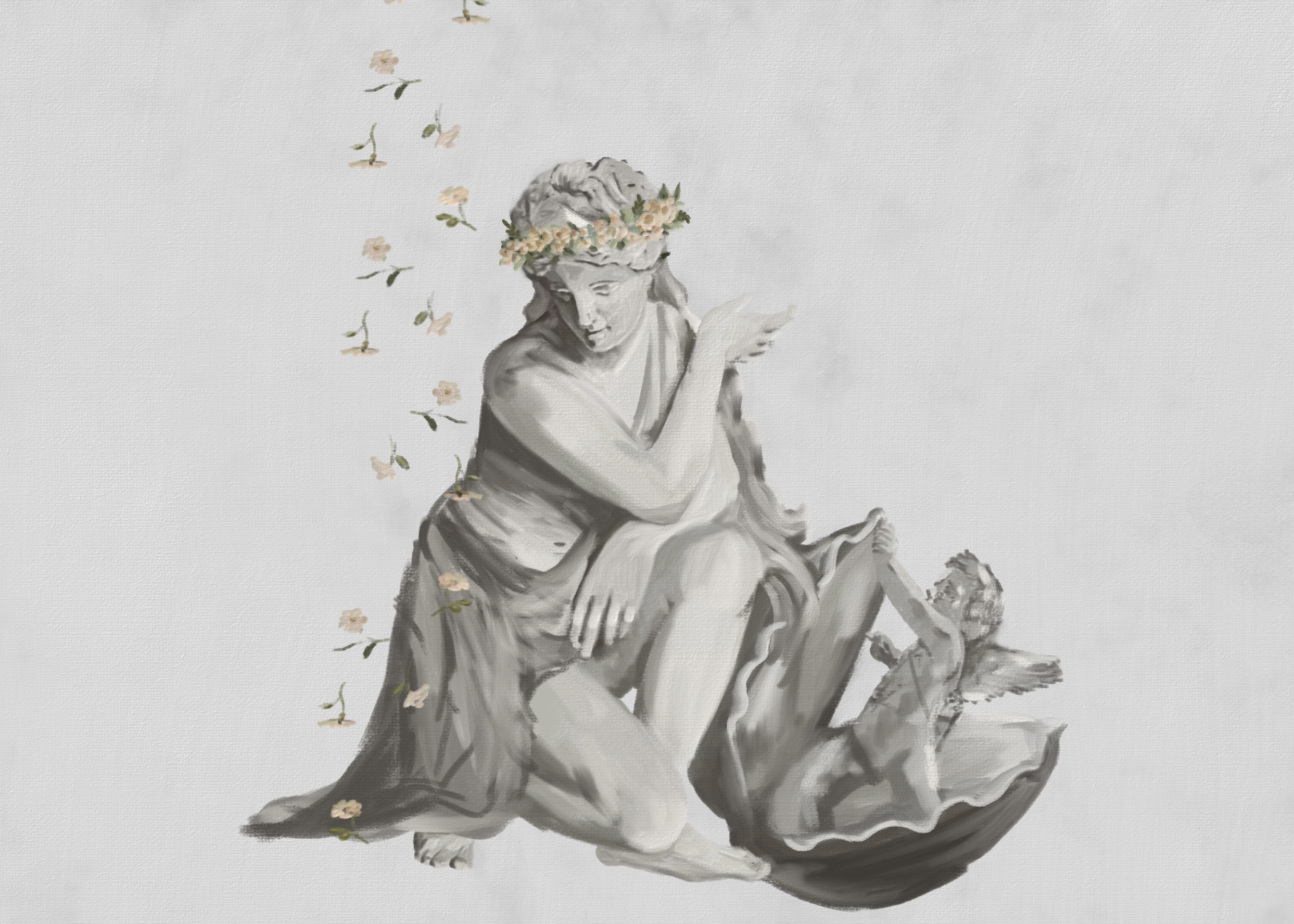Cupid is overrated: a case for celebrating Aphrodite instead
Forget Cupid’s random arrows—let’s celebrate Aphrodite, the goddess of self-love, empowerment, and authentic connection.
Seriously, why are we still trusting a baby with a bow and arrow to take charge of Valentine’s Day? Cupid shows up uninvited every February, shooting arrows at random people and calling it romance.
It’s time for us to ditch the chubby toddler playing matchmaker. Instead of letting a winged infant take control of our love lives, why not celebrate someone who actually knows a thing or two about love? Make way for Aphrodite, goddess of beauty, passion, and self-love. Unlike Cupid, who thrives on chaos and unrealistic romantic ideals, Aphrodite symbolizes confidence, beauty, and empowerment. And in a world where relationships are unpredictable and self-love is finally getting the recognition it deserves, she’s exactly the kind of energy we want.
Aphrodite’s ideas make more sense for university students swiping through dating apps, navigating situationships, and the occasional identity crisis. It’s time to say bye-bye to Cupid’s stupid arrows and celebrate love on our own terms.
Cupid, despite his sweet and lovable appearance: a chubby baby with a bow in his hand, has a more chaotic than charming history. In Roman mythology, Cupid shoots arrows that cause uncontrollable desire, often leading to unpredictable and sometimes unwanted romantic affairs. It is said that his power was more associated with punishment than a gift. Cupid’s mischievous behaviours do not stop there: on top of that, he has been known to stir up trouble among the gods themselves, igniting unwanted romance that could lead to rivalry.
Cupid vs Aphrodite: our evolving notions of love
Cupid’s symbolism of love is often portrayed as random and involuntary, which contrasts and undermines the modern understanding of relationships, where mutual respect and consent are emphasized.
In addition, the ugly sides of love, like jealousy and betrayal, are often associated with many myths related to Cupid. Intentional connection is becoming increasingly popular among young adults, especially university students. Relying on Cupid’s outdated narrative suggests that love is just a random occasion, pulling us away from personal agency.
On the other hand, Aphrodite makes herself a much more compelling figure to be associated with Valentine’s Day. It is time we give her more credit and spotlight. Unlike her son, Aphrodite embodies intentional love and personal choice.
In mythology, Aphrodite’s relationships highlight themes of choice and agency. Despite being forced into an unhappy marriage with Hephaestus by Zeus, Aphrodite wasn’t going to let the gods dictate her love life; she found herself bound to a man chosen for her, not by her. And while Hephaestus was kind and skilled, their marriage was convenient, not passionate. Ares, the god of war, was the man Aphrodite truly wanted.
Unlike the mischievous Cupid, who plays a matchmaker with no regard for consent, Aphrodite chose love on her terms, refusing to be confined to a marriage that didn’t fulfil her, embodying the belief that love should be about connection.
To this day, Aphrodite’s story resonates deeply in a world that still pressures people, especially women, to “settle” for stability over passion. Her story is not about scandal but about self-determination, and it continues to encourage us to celebrate our individuality and recognize our inner beauty.
On a deeper level, why should we villainize a goddess for rejecting a forced marriage when we praise people today for leaving relationships that don’t serve them? By channelling Aphrodite’s energy, we can learn a thing or two about approaching relationships confidently and clearly, prioritizing genuine connections over fleeing infatuations.
Beyond the mythological: what Aphrodite can teach us about the real world
In an age where social media defines beauty standards and relationship ideals, and romantic ordeals are increasingly commodified by dating apps, aesthetics, and the cost of living, students face issues like low self-esteem, body image concerns, and self-doubt. We need a new Valentine’s Day icon, one who embodies self-love, empowerment, and authenticity. As the goddess of love and beauty, Aphrodite embodies self-acceptance and the celebration of one’s unique form. Her message is clear: love, whether romantic, platonic, or self-directed, should be intentional.
Body positivity movements, like the viral Aphrodite Girl Summer trend on TikTok, encourage people to embrace their natural beauty rather than chase unrealistic ideals. Meanwhile, mental health advocacy has emphasized self-care, aligning with Aphrodite’s indulgence and self-worth teachings. Students today face overwhelming academic and social pressures, but Aphrodite offers a refreshing alternative: love should not be performative or commercialized but deeply personal and fulfilling.
On TikTok, people share their Aphrodite affirmations, daily offerings, and self-love rituals, proving that her influence is not just mythological. Instead of celebrating love with mass-produced roses and overpriced chocolates, why not embrace love the Aphrodite way? Through self-confidence and self-care, she reminds students that real love, whether for oneself or another, starts from within.
Valentine’s Day has become a capitalist dream: stuffed bears, overpriced chocolates, and awkward date nights. But what if we ditched Cupid’s outdated love lottery and embraced Aphrodite’s vision instead? Reimagining Valentine’s Day through her lens means celebrating love in all its forms: romantic, platonic, and, most importantly, self-love.
Instead of stressing over last-minute gift shopping, why not make the day about indulgence and empowerment? Host a Galentine’s-style Aphrodite night with friends, with luxurious food (think honey, figs, and dark chocolate: Aphrodite-approved party food). Swap your Dollar Store greeting cards with handwritten love letters to yourself or affirmations about what makes you feel beautiful and powerful. Even TikTok has caught on, with creators showcasing their Aphrodite-inspired self-care ritual, from rose petal baths to confidence-boosting mirror work.
And let’s be honest, Aphrodite wouldn’t waste time over a ghosted Tinder date. Take a page from her book this Valentine’s Day: prioritize passion, confidence and meaningful connections. Love should feel genuine. So, skip Cupid’s chaos and embrace the Aphrodite effect.

